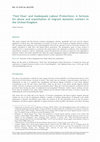Papers by Daphne Demetriou
Anti-Trafficking Review, 2015
This is an open-access article distributed under the terms of the Creative Commons Attribution Li... more This is an open-access article distributed under the terms of the Creative Commons Attribution License (CC-BY). Under CC-BY license, the public is free to share, adapt, and make commercial use of the work. Users must always give proper attribution to the author(s) and the Anti-Trafficking Review.

International Criminal Justice Review, 2018
Efforts to eradicate human trafficking continue, with the 2017 Trafficking in Persons Report call... more Efforts to eradicate human trafficking continue, with the 2017 Trafficking in Persons Report calling on governments to improve the detection and prosecution of all involved in this crime, with specific reference to recruitment agencies. Yet despite calls to examine the wider scope of potential trafficking perpetrators, an important element remains problematic; namely, establishing that all involved in the recruitment and movement of individuals possess the requisite mental element for this crime. This article examines this mental element and applies it to the different actors commonly involved in the migration and alleged trafficking of migrant domestic workers. The article concludes that establishing such experiences as human trafficking and attributing the mental element of the offense to all people in the supply chain becomes less attainable. The flexibility permitted under the United Nations Trafficking Protocol, as to the national threshold for the crime’s mens rea, has resulte...
International Journal of Sustainable Society

This article examines the link between restrictive immigration schemes, specifically ‘tied visas’... more This article examines the link between restrictive immigration schemes, specifically ‘tied visas’ and the selective application of labour laws, with exploitation of workers. It focuses on the situation of migrant domestic workers, who accompany their employers to the United Kingdom (UK) and are exposed to both an excessively restrictive visa regime, introduced in April 2012, and limited labour protections. The immigration status of these workers is currently tied to a named employer, a restriction that traps workers into exploitative conditions, often amounting to forced labour, servitude or slavery. Additionally, current UK labour laws are either not enforced or not applicable to domestic workers. The article concludes that unless the current immigration regime is abolished and comprehensive labour law protections are extended to migrant domestic workers, exploitation will continue.











Uploads
Papers by Daphne Demetriou